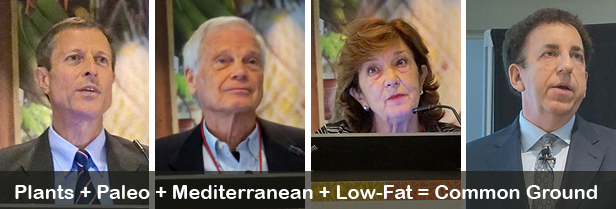When Oldways announced its groundbreaking Common Ground Consensus on healthy eating on November 18, our main goal was to replace confusion with common sense and consensus.
Almost immediately afterwards, we started to get feedback from people who had expected more of an Eat so many milligrams of this on Monday and so many grams of that on Tuesday pronouncement to come down from on high. Our message to these folks: You re making healthy eating much too complicated. Take a deep breath and trust your own common sense.
I almost wish we had called this conference Finding Common Sense instead of Finding Common Ground, because that’s what emerged. For instance:
Neal Barnard, one of the country’s leading proponents of eating a totally plant-based diet, said (not surprisingly) that vegetables, fruits, legumes, and whole grains should be primary diet staples. But he also said, Meat (including fish), dairy products, and eggs should be considered optional, not required.
Boyd Eaton, widely recognized as the originator of the Paleo diet movement, said (not surprisingly) that our ancestors lived largely on wild game animals, fish, shell fish and uncultivated plant foods. Then he also said, Red meat is incompatible with environmental health in a sustainable world. We need a diet that equals the nutrition of our Paleo ancestors, but is sustainable.
Dr. Barnard would love to see everyone stick with plants, but common sense told him most Americans health would vastly improve even if they still ate animal products occasionally, as long as they up their plant-food game. Dr. Eaton would love to see everyone eat more meat and fish, but common sense told him our planet can only feed 100 million people not 7.3 billion unless we get most of our protein from plants.
Common sense and quality were unending themes in virtually all of our Common Ground Scientists presentations. Whats better, animal foods or plant foods Both Dr. Barnard and Dr. Eaton said, Whichever you eat, look for simple, relatively unprocessed foods. What’s better, low fat diets, like those championed at our conference by Dean Ornish or a relatively high-fat Mediterranean diet, like that Antonia Trichopoulou and Miguel Martínez-González have studied for decades Our scientists produced evidence, over and over, that it’s the quality of fats that matters, more than the quantity. They all saw the same forest, even though they each emphasized different trees.
This conference wasnt about converting anyone from one food religion to another, but about discovering and conrming what all healthy eating patterns have in common. As Michael Pollan said with seven simple words: Eat food. Mostly plants. Not too much. (We invited Mr. Pollan but he had a scheduling conflict.) Everything presented at the conference backed up this statement. We know the difference between food and food-like substances. We know that our portions are way larger than we need to sustain us. We know that plants are the best common ground between good for us and good for the planet.
At the end of the day, there are many different ways to eat well. Whether you like your foods spicy or plain; whether you’re vegan, vegetarian, flexitarian or omnivorous; whether you live in Beijing or Boston the good news is that there are many different foods and flavors that all lead to better health than the Standard American Diet (or SAD).
Then why are so many of us so confused Confusion is a powerful market force that helps sell everything from food to magazines. Sure, there are external forces sowing confusion. But there’s an internal force, too one you can control because heres the big secret: Confusion gives us a reason not to change our engrained habits. Take a minute today to pause and ask yourself, how confused am I, really Whats stopping me from eating better
Look in your cupboard, look in your refrigerator, and look in your grocery cart. Ask yourself what you can change for the sake of your health and that of the planet. Prioritize the time needed to shop for and prepare good quality food, and be rewarded with delicious tastes and better health. We’ll be standing by, here at Oldways, with the recipes, cooking tips, and other support you need.
Cynthia Harriman, Oldways Director of Food and Nutrition Strategies
This is the second in a series of 13 weekly blogs about the Oldways Common Ground Consensus.







Leave a comment